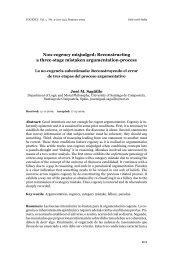Cogency v2 n2
Cogency v2 n2
Cogency v2 n2
You also want an ePaper? Increase the reach of your titles
YUMPU automatically turns print PDFs into web optimized ePapers that Google loves.
COGENCY Vol. 2, N0. 2, Spring 2010<br />
4.2 Disagreement and Understanding<br />
If someone doubted whether the earth had existed<br />
a hundred years ago, I should not understand, for<br />
this reason: I would not know what such a person<br />
would still allow to be counted as evidence and what<br />
not. (Ludwig Wittgenstein, OC § 231)<br />
Suppose, then, that there were two peoples, otherwise alike in practices,<br />
each of whom had the homophonic utterance “blah.” Suppose further that<br />
in one culture utterances of this sort prompted ‘affirming behaviour,’ whatever<br />
that might turn out to be, say, nodding the head and smiling. But in the<br />
other culture, suppose that this same utterance prompted ‘rejecting behaviour,’<br />
say, shaking the head and frowning. (Notice that the very detectability<br />
of any disagreement, deep or otherwise, presupposes some shared practices<br />
including asserting and denying, accepting and rejecting.) What reason<br />
have we for saying that the two peoples disagree about the acceptability<br />
of the same claim, assertion or proposition? First we require some evidence<br />
that the two homophonic utterances have the same meaning in the two<br />
different language games.<br />
Consider now that a variety of other utterances employed by each of the<br />
two peoples were considered in series, yet for each of these there was absolutely<br />
no accord as to whether the newly considered expression was positively<br />
relevant, negatively relevant, or irrelevant to the original target expression.<br />
At some point, we will reach the conclusion not that these peoples<br />
disagree deeply about the acceptability of some claim, but instead that they<br />
mean two completely different things by this homophonic expression. The<br />
very same evidence that points to the conclusion that they disagree deeply<br />
about something, also points to the conclusion that they are doing different<br />
things with that expression.<br />
Considerations such as these might lead one to the Davidsonian ([1974]<br />
2001) conclusion that radically different conceptual schemes are either a<br />
priori impossible (since translatability is a condition of truth specification)<br />
or methodologically precluded (since attempts at understanding demand<br />
hermeneutic charity). Against this, Hacker (1996) claims that pronounced<br />
differences in conceptual schemes are not only conceivable but are distinct<br />
from differences of opinions. A disagreement in concepts, Hacker (pp. 302-<br />
303) writes:<br />
48








